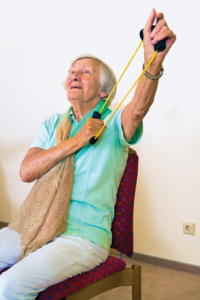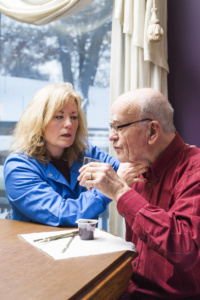3 Types Of Exercise To Maintain
Ability and Promote Longevity
Article by | Lizzie West
As a family member that has recently become a primary caregiver, it was hard watching my family member’s health decline from their lack of knowledge in proactive health habits, followed by fighting to regain some ability in order to keep them safe and healthy. Change is hard, and they resisted suggestions for healthier habits, often times until they saw a need or experienced a setback.
Overall, what helps me most as a caregiver is having support from family members to encourage my loved one to commit to updates to their lifestyle and making them part of the routine. In this article, I’m sharing three ways we have updated the daily routine of my loved one to help maintain physical and mental health. I hope by sharing these practices, it encourages you to implement a few of them to improve your loved one’s longevity and quality of life, giving you more time together.
Physical Exercise
Everyone is exhausted by this statement, but the COVID shutdown was a hard time for many – especially older people who spent much of this time isolated and sedentary. We tried to encourage walks and movement, but they weren’t motivated and we had no real indication that they were declining over that time. Sadly, it snuck up on us. However, we have seen the negative effects and are committed to regular physical exercise now. One way I encourage this is by helping arrange outings with their friends. I also contacted their doctor to request physical therapy. If the decline is enough that your loved one has difficulty leaving their home, doctors can order help from home health agencies and therapists who can come out to work with your family member on creating an exercise routine that will challenge to them to rebuild muscle, balance, and stamina.
Being involved in the therapy, learning what exercises are encouraged, and doing those exercises with your loved one, are all ways that you can help them with this stage. You may ask other family members to do these exercises with your loved one on a regular schedule, too. Some useful exercises we do are walking, practicing sitting to standing, squeezing a pillow between the knees, and hip abduction using resistance bands. These help with overall muscle strength, joint health, and pain management. These are things we learned from working with a trained physical therapist. It’s worth trying, even if you can only get your loved one to commit to a few exercises a day.
Speech Therapy
You may be thinking – ‘my family member has NO problem talking.’ Though they may be a great story teller or have plenty of opinions to share, there are other resources a speech therapist provides that has nothing to do with talking. With age, and certain health concerns, your loved one may have developed certain eating habits that have gone unnoticed. They may prefer softer foods, which can indicate they are having more difficulty with eating and swallowing. This may not have happened yet, but it is something that can be hard to recognize. Having an evaluation by a speech therapist can offer resources and exercises to prevent this from happening for a time. We met with a therapist and found that we were doing everything right for brain and speech, but had still missed that the swallow muscles were weakening. The therapist created a simple swallow promoting exercise routine to help my family member strengthen these muscles. The therapist also encouraged us prepare foods with a variety of textures in order to work these muscles.
Trained therapists can also offer exercises to help overall brain-to-speech health. We had already implemented a lot of these types of exercises.
Brain Maintenance
After retirement or battling major illness, family members may begin losing other abilities – basic skills they had from working and having expected daily responsibilities. Basic math, logic, and the ability to write on their own can decline. It seems the world has become so dependent on tapping on screens to communicate, that we no longer rely as much on our ability to physically write. Before becoming the caregiver for my loved one now, I didn’t realize they were losing this ability. Once I noticed, I quickly jumped to action to find a way to help.
We have given my loved one a ‘job’ again. Their ‘job’ is to maintain a schedule of completing activities that help with handwriting and other skills. Cell phone apps are GREAT – let your loved ones play brain games. However, there is something important about the simplicity of physically writing that you can’t get from apps. If your loved one is able, schedule time for them to write twice a week in greeting cards to friends and family for handwriting maintenance. This was a frustrating challenge for my loved one, so I implemented handwriting books twice a week, with both print and script. Also, twice a week, my family member completes one page of basic math calculations by hand, without a calculator. At first it was hard for them, but over time, they have found it helpful and they don’t need reminding or prodding to complete these activities.
Lastly, we encourage engagement in “creative time”. This is any fine motor skill activity that my loved one enjoys doing without a specific end goal. It can be word searches – their personal favorite – or coloring books, crosswords, etc. This is anything they do that promotes hand-eye coordination and accessible cognition. And, because decline can happen to any one of us, getting yourself a work book to do with your family member is a great idea. Because, you can’t take care of your loved one if you aren’t also taking care of yourself and spend time together in the process.
This seems like a lot to take in – and it is. But, after a little bit of preparation and encouragement, these things will simply become part of your family’s regular health routine.
 Lizzie West is a local B/CS baker, make-up artist, Mary Kay consultant, writer, and the Bryan Broad-casting Digital Content Coordinator. Find more of her contributions and recipes in our magazines including Brazos Wellness, PEACE: Brazos Christian Life, Brazos Family, and Brazos Valley Bride at BrazosLife.com.
Lizzie West is a local B/CS baker, make-up artist, Mary Kay consultant, writer, and the Bryan Broad-casting Digital Content Coordinator. Find more of her contributions and recipes in our magazines including Brazos Wellness, PEACE: Brazos Christian Life, Brazos Family, and Brazos Valley Bride at BrazosLife.com.



